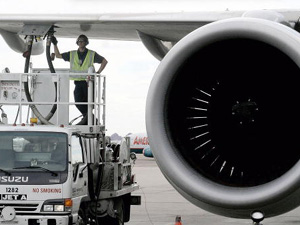|
Audio
Photos
More from MPR
Resources
|
January 5, 2005
Delta Airlines has set off what one analyst calls "the most dramatic round of airfare cuts in more than a decade." The Atlanta-based airline capped domestic coach fares at $500 one-way and slashed prices across the country as much as 50 percent. Eagan-based Northwest Airlines has criticized the move, but was among the first to cut fares too.
Eagan, Minn — On Wednesday morning, a Northwest Airlines flight from Minneapolis to Salt Lake City cost $642. By Wednesday afternoon, you could get that same ticket for $265, a cut of almost 60 percent.
That's after Northwest slashed fares around the country to compete with Delta, which also flies direct to Salt Lake. Delta's new strategy is called "Simplifares." The airline got rid of practices like requiring Saturday-night stays and large fares for last-minute ticket buyers. And it ditched the complicated pricing formulas that are a staple of the major airlines.
Delta's fares now look a lot more like its low-fare competitors such as Southwest and JetBlue. The biggest winners are likely to be business travelers because the short-stay, last-minute fares they used to pay no longer exist. The change does not affect certain flights sold by Delta but operated by Delta's marketing partners, including Northwest.
In a typical fare war, airlines bid each other down on a set of specific routes. But by changing its entire pricing structure on every domestic route, Delta raised the stakes significantly.
The CEO of BestFares.com, Tom Parsons, was watching for some sort of response. By late morning, he had it.
"We are seeing now that Northwest and US Airways have jumped on the bandwagon and matched probably 90 percent of American cities. There are still those cities in Minnesota that have not been added -- Duluth, Fargo, Rochester. And we do expect those cities will be added. But they have matched a majority of fares issues by Delta early this morning, and we now expect the other airlines to be forced to look at this even harder now," he said.
If United, American, or Continental join in, the momentum will only increase. Parsons expects the most dramatic airfare cuts since 1992.
By all accounts, Delta's competitors do not want this. Yesterday, Northwest released a statement saying Delta's changes would hurt revenue and damage the industry if they took hold at other airlines. Northwest spokesman Kurt Ebenhoch says the airline still stands by that statement.
But he made one small addition. "Northwest Airlines has always offered its product at competitive prices, and will continue to do so."
Even if Northwest and its competitors think Delta's idea is a terrible one, refusing to match means losing passengers to them.
Delta says the theory behind Simplifares is that lower fares will attract more flyers. Along with improvements in efficiency, this will make up for the money lost through ticket prices. A four-month test-run in Cincinnatti increased Delta's traffic there by 30 percent and improved customer satisfaction.
But Delta officials were unwilling to confirm whether the experiment had actually increased revenue. Airline consultant Jon Ash doubts that it did. "If you're a consumer, I think you've got to love it. But from an industry perspective, I think you've got to be really skeptical," he said.
Skeptics abound. Airline stocks sunk following Delta's announcement, including an 11-percent drop for Northwest. Merrill Lynch says if the fares spread, it could cost the industry $3 billion in annual revenues.
Delta's shares sank 51 cents, or nearly 7 percent, to close at $6.80 on the New York Stock Exchange. Northwest shares fell $1.04, or 10.8 percent, to close at $8.60 on the Nasdaq Stock Market. Continental shares fell 99 cents, or 8.1 percent, to $11.21 on the NYSE, where American was off 96 cents, or 9.6 percent, to close at $9.05.
Ash says U.S. domestic flights are already as full as they have been in years, making the passenger numbers Delta hopes for "impossible" to achieve. Ash believes Delta may actually be angling to put US Airways out of business. The bankrupt airline is the most vulnerable right now, and overlaps with many Delta routes east of the Mississippi.
The effect of all this on Minnesota travelers remains to be seen. With some exceptions, like that flight to Salt Lake City, Northwest has not lowered fares on flights originating from its hub cities. Ash does not expect that to change.
"Some carriers have their hubs very well protected, and at least in and out of their hubs they may do very little. In other words, the impact on a hub city like Minneapolis may be far less," he said.
But others, like BestFares CEO Tom Parsons, disagree. Delta, he says, has changed the game this time. His projection: Even hubs like Minneapolis will see sharply lower fares, perhaps within a week.




